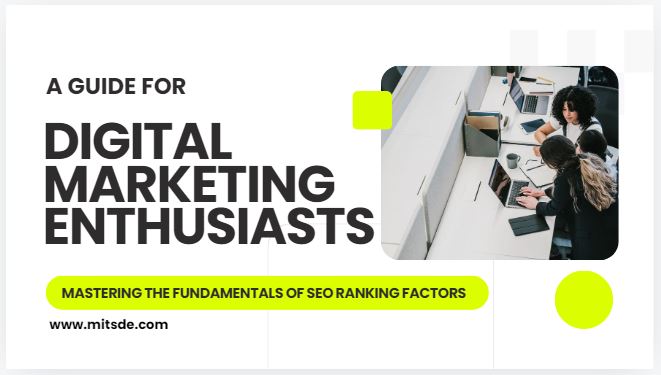
Introduction: The Ever-Evolving World of SEO
In the vast digital landscape, Search Engine Optimization (SEO) is a beacon for businesses and individuals seeking to enhance their online visibility. As search engines continually refine their algorithms, understanding the fundamentals of SEO ranking factors has become more crucial than ever. This comprehensive guide will walk you through the essential elements that influence your website’s position in search engine results pages (SERPs), helping you confidently navigate the complex world of digital marketing.
The Foundation: On-Page SEO Factors
Content is King: Quality and Relevance
At the heart of SEO lies content. Search engines prioritize websites that offer users valuable, relevant, and engaging content. Here’s what you need to know:
- Focus on creating in-depth, informative content that addresses user queries
- Use relevant keywords naturally throughout your content
- Ensure your content is original and provides unique insights
- Update your content regularly to maintain its relevance
Optimizing Meta Tags
Meta tags are crucial in communicating with search engines about your content. Key meta tags include:
- Title tags: Craft compelling, keyword-rich titles under 60 characters
- Meta descriptions: Write concise, informative summaries of your page content
- Header tags (H1, H2, H3): Use these to structure your content logically
URL Structure
A well-structured URL can significantly impact your SEO. Consider these tips:
- Keep URLs short and descriptive
- Include relevant keywords in the URL
- Use hyphens to separate words
- Avoid using numbers or special characters
Off-Page SEO: Building Authority and Trust
Backlinks: The Backbone of Off-Page SEO
Backlinks remain one of the most important ranking factors. Here’s what you need to focus on:
- Aim for high-quality, relevant backlinks from authoritative websites
- Diversify your backlink profile with a mix of dofollow and nofollow links
- Engage in natural link-building strategies, such as guest posting and creating shareable content
Social Signals
While not a direct ranking factor, social signals can indirectly influence your SEO:
- Encourage social sharing of your content
- Maintain active social media profiles
- Engage with your audience across various social platforms
Technical SEO: The Silent Game-Changer
Site Speed and Performance
In today’s fast-paced digital world, site speed is crucial:
- Optimize images and videos
- Minimize HTTP requests
- Leverage browser caching
- Consider using a Content Delivery Network (CDN)
Mobile-Friendliness
With mobile searches dominating, having a mobile-friendly website is non-negotiable:
- Implement responsive design
- Ensure easy navigation on mobile devices
- Optimize for touch-screen interactions
Site Architecture and Crawlability
Help search engines understand and index your site efficiently:
- Create a clear, logical site structure
- Use XML sitemaps
- Implement internal linking strategically
User Experience: The Human Side of SEO
Engagement Metrics
Search engines increasingly consider user behavior as a ranking factor:
- Focus on reducing bounce rates
- Aim to increase time on-site
- Encourage page views per session
Site Security
HTTPS is no longer optional for websites aiming for top rankings:
- Implement SSL certificates
- Ensure all resources are loaded over HTTPS
Emerging Trends: AI in Digital Marketing
As we delve deeper into the world of SEO, it’s impossible to ignore the growing influence of Artificial Intelligence (AI) in digital marketing. AI is revolutionizing the way we approach SEO and digital marketing strategies:
AI-Powered Content Creation
- AI tools can help generate content ideas and even draft articles
- Natural Language Processing (NLP) aids in optimizing content for search intent
- AI can analyze vast amounts of data to predict content trends
Personalized User Experiences
- AI algorithms can tailor website content based on user behavior and preferences.
- Chatbots powered by AI provide instant, personalized customer support
Predictive Analytics
- AI can forecast SEO trends and search patterns
- Machine learning algorithms help identify potential ranking opportunities.
Career Accelerator Programs in Digital Marketing
For students, working professionals, and freelancers looking to excel in the field of digital marketing and SEO, career accelerator programs offer a fantastic opportunity to gain practical skills and industry insights:
Benefits of Digital Marketing Career Accelerator Programs
- Hands-on experience with real-world projects
- Mentorship from industry experts
- Networking opportunities with peers and potential employers
- Up-to-date curriculum reflecting the latest industry trends
Critical Components of Effective Programs
- Comprehensive SEO training covering all aspects discussed in this article
- Practical experience with SEO tools and analytics platforms
- Modules on content marketing, social media marketing, and paid advertising
- Projects that simulate real-world digital marketing challenges
Choosing the Right Program
- Look for programs with a strong focus on practical, hands-on learning
- Check the credentials and industry experience of the instructors
- Ensure the program covers emerging trends like AI in digital marketing
- Consider programs that offer job placement assistance or internship opportunities
Putting It All Together: A Holistic Approach to SEO
While understanding individual ranking factors is crucial, it’s equally important to adopt a holistic approach to SEO:
Integrating SEO with Overall Marketing Strategy
- Align your SEO efforts with your broader marketing goals
- Ensure consistency across all marketing channels
- Use SEO insights to inform other marketing initiatives
Continuous Learning and Adaptation
- Stay updated with the latest SEO trends and algorithm updates
- Regularly audit your website and SEO strategies
- Be prepared to adapt your approach as search engine algorithms evolve
Measuring Success and ROI
- Set clear, measurable SEO goals
- Use analytics tools to track your progress
- Regularly report on key performance indicators (KPIs)
Conclusion: Embracing the SEO Journey
Mastering the fundamentals of SEO ranking factors is an ongoing journey. As search engines continue to evolve, so must our strategies and understanding. By creating valuable content, building authority, ensuring technical excellence, and prioritizing user experience, you’ll be well-positioned to achieve SEO success.
Remember, SEO is not just about ranking high in search results; it’s about connecting with your audience and providing value. Whether you’re a student just starting your digital marketing journey, a working professional looking to enhance your skills, or a freelancer aiming to offer top-notch SEO services, understanding these fundamentals is your first step toward success in digital marketing.
As you continue to explore and apply these SEO principles, consider leveraging AI tools and enrolling in career accelerator programs to stay ahead of the curve. The digital marketing landscape is ripe with opportunities for those willing to learn, adapt, and innovate. Embrace the challenge, stay curious, and watch as your digital marketing efforts yield impressive results.


